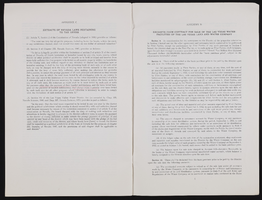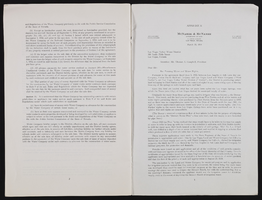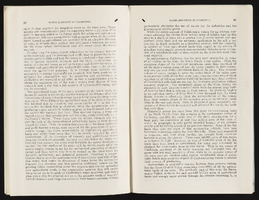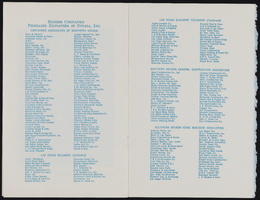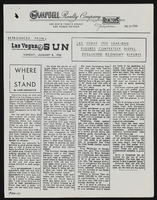Search the Special Collections and Archives Portal
Search Results
Fercos Family Publicity Collection
Identifier
Abstract
The Fercos Family Publicity Collection (approximately 1978-1989) contains newspaper articles, advertisements, and a poster promoting the Flying Fercos, a family of juggling and acrobatic performers who performed in Las Vegas, Nevada at the Dunes Hotel during the 1970s and 1980s. The materials document the Fercos family's act as part of producer Frederic Apcar's shows such as
Archival Collection
Jack Anderson Professional Papers on Operation Life
Identifier
Abstract
Materials in this collection (1969-1989) document various endeavors of the Operation Life organization. They include original correspondence, meeting minutes, news clippings, medical programs, grant applications, legal and financial documents, brochures and pamphlets, and other materials that provide context on the kinds of services provided by Operation Life. These files were kept by Jack Anderson in the course of his work as attorney for Operation Life.
Archival Collection
Tamara Pickett Papers
Identifier
Abstract
The Tamara Pickett Papers (1977-1998) are comprised of materials related to the experiences of transgendered individuals in America. The collection includes transgender publications, scientific articles about sex reassignment surgery, and informational material provided to Pickett from various doctors as she planned her own sexual reassignment surgery.
Archival Collection
Katherine L. Rankin oral history interview
Identifier
Abstract
Oral history interview with Katherine L. Rankin conducted by Claytee D. White on June 16, 2014 for the Boyer Early Las Vegas Oral History Project. In the interview, Rankin discusses her childhood, her move to Las Vegas, Nevada, and her career as a librarian. Rankin talks about how she began her library career on the Gila River Reservation in Arizona before accepting a position as an audio and visual materials cataloger at University of Nevada, Las Vegas (UNLV) in the 1970s. Rankin later describes her work with the American Library Association, getting tenure at UNLV, and her role as a map cataloger in UNLV Special Collections and Archives.
Archival Collection
C. A. Earle Rinker Papers
Identifier
Abstract
The C. A. Earle Rinker Papers (1880-1960) contain materials that document the history of early twentieth century Goldfield, located in central Nevada, as well as the life of Rinker. Materials in the collection include correspondence, mining prospectuses, maps, ledgers, souvenirs, photographic negatives, and ephemera that document mining and daily life. Also included is biographical material that tells the story of Earle Rinker and his family before 1906 and after 1909, documenting his life in Indiana and Illinois.
Archival Collection

